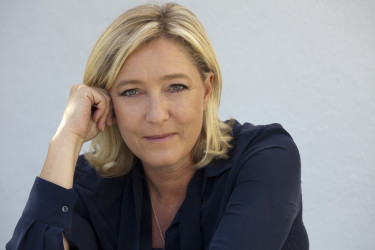PARIS, (Reuters) – France’s far-right National Front pulled off a historic win yesterday, topping the vote in the first round of regional elections, in a breakthrough that shakes up the country’s political landscape before 2017 presidential elections.

Boosted by fears over the Islamic State attacks that killed 130 people in Paris on Nov. 13, as well as by record unemployment and immigration, Marine Le Pen’s party secured 29.4 percent of the vote nationally, the interior ministry said, with over 85 percent of the votes counted.
That is the highest score ever for the anti-Europe, anti-immigration party, which came first in six regions out of 13.
“This is a historic, extraordinary result,” FN lawmaker Marion Marechal-Le Pen told TF1 television. “The old system died tonight.”
Twenty-five year old Marechal-Le Pen, the granddaughter of party founder Jean-Marie Le Pen and niece of party leader Marine, led the first round in southeast France with 42 percent – twice her grandfather’s score there in 2010. Run-offs will be held on Dec. 13.
Even one outright victory would be a major boost for Le Pen, who wants a base of locally elected officials to help her target power at the national level.
Her eye is on the 2017 presidential and parliamentary elections, with French politics now clearly a three-way race after Sunday’s election, ending decades of domination by the Socialists and conservatives.
While the FN is well placed to win one or more regions in the Dec. 13 run-off, especially after Marine Le Pen attracted over 41 percent of the votes in the north, the Socialist party lowered its chances of doing so by announcing that it was pulling its candidates out of the race there and in the southeast.
The Socialist party is putting up a “barricade” to the far-right where it is far behind, party chief Jean-Christophe Cambadelis said. “The Left is the last shield of democratic France against the xenophobic far-right,” he said.
However, opinion polls before the election had shown that Le Pen could win even if the Socialists pulled out.
Right-wing daily Le Figaro’s front page on Monday will read “The Shock,” while left-wing daily Liberation headlines “It’s getting closer,” referring to the party’s quest for power. The FN’s success comes as a wave of hundreds of thousands of refugees from conflict and poverty in the Middle East, Asia and Africa boosts support for eurosceptic parties across Europe, from Germany’s AfD party to Britain’s anti-EU UK Independence Party and the Law and Justice government in Poland.
Long content with attracting protest votes, the FN has changed strategy since Le Pen took the party over from her father Jean-Marie in 2011, seeking to build a base of locally elected officials to target the top levels of power.
The FN has in the past won control of less than a dozen French towns, but has never taken an entire region. Former President Nicolas Sarkozy ruled out any pact with President Francois Hollande’s Socialist party to keep the far-right out.
Sarkozy’s conservative Republicans party and their allies came second in the overall national vote, at just under 27 percent, behind the far-right National Front but ahead of the Socialists at 22.7 percent, according to an interim count of the votes.
The conservatives and their allies were leading in four regions, including Paris, and the Socialists in three. Sarkozy, who just a few weeks ago was hoping for a landslide victory that would boost his chances for 2017, faces a smaller victory than expected on Dec. 13 because of the FN’s growing popularity.
Hollande’s Socialists, who had won all but one region in 2010, face major losses next week but can hope to win points in the longer term with their decision to pull out of some regions to try and keep the FN out of power there.




